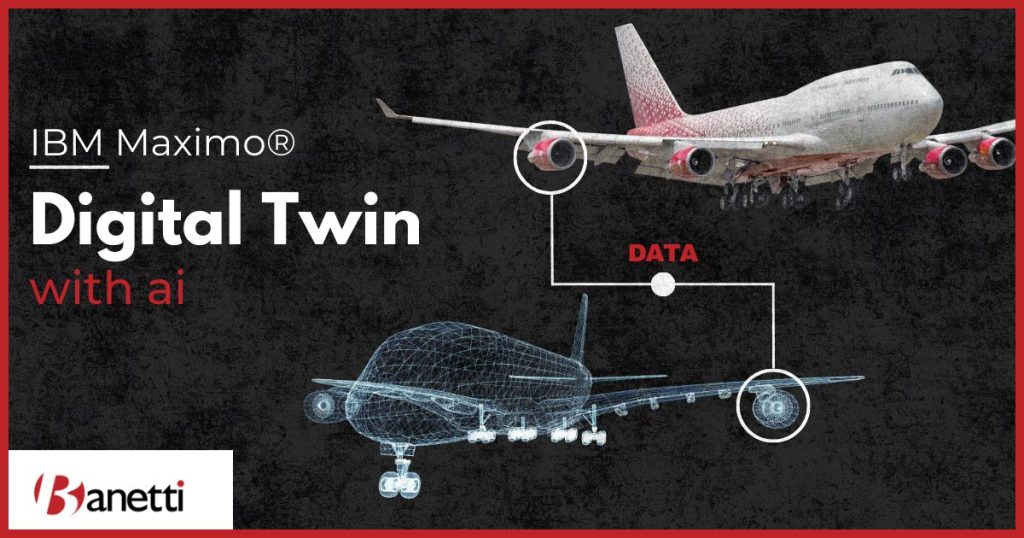5 Min Read
Table of contents

Companies are always on the lookout for smarter ways to manage and optimize their assets. Digital twin technology is a revolutionary approach that creates virtual replicas of physical assets, enabling real-time monitoring, predictive maintenance, and data-driven decision-making.
IBM Maximo® takes digital twin technology to the next level by integrating AI, IoT, and advanced analytics to offer businesses unprecedented control over their assets. With the ability to anticipate failures before they happen, achieve greater efficiency, and enhance sustainability, IBM Maximo® digital twins are transforming industries ranging from manufacturing to healthcare, energy, and beyond.
This guide explores how IBM Maximo® digital twins work, their key features, benefits, and real-world applications, helping organizations harness the power of AI to drive efficiency and innovation.
What Are Digital Twins in IBM Maximo®?

Imagine having a highly detailed virtual copy of a physical object, like a factory machine or a power grid. This virtual model, known as a digital twin, mirrors the real-world asset in real time using relevant data from sensors and IoT devices.
IBM Maximo® enhances this concept by integrating AI, predictive analytics, and machine learning to offer deeper insights into asset performance. These digital twins help businesses detect potential failures before they happen, streamline maintenance schedules, and make data-driven decisions to optimize operations.
Whether it’s monitoring an oil rig, a hospital’s equipment, or an airline’s fleet, IBM Maximo® digital twins provide an intelligent way to manage assets more efficiently and cost-effectively. A digital twin is a virtual representation of a physical asset, updated with real-time data to provide a comprehensive view of its operational status.
Key Features of IBM Maximo® Digital Twins with AI

IBM Maximo® offers a suite of powerful features that provide real-time monitoring, predictive maintenance, and insights that help businesses enhance efficiency and reduce operational risks.
Here are the features:
Real-Time Monitoring and IoT Integration
IBM Maximo® connects digital twins with IoT sensors to gather real-time data on asset performance. This integration enables continuous monitoring of equipment, providing insights into wear and tear, energy consumption, and maintenance needs.
Predictive Maintenance
Using AI and machine learning algorithms, IBM Maximo® predicts potential equipment failures before they occur. This proactive approach reduces unplanned downtime, minimizes repair costs, and extends the lifespan of assets.
Enhanced Decision Making
IBM Maximo® digital twins consolidate sensor data and historical records to offer a holistic view of asset conditions. AI-powered analytics enable better decision-making by identifying patterns, optimizing workflows, and suggesting maintenance schedules.
IBM Digital Twin Exchange Integration
Organizations can access a marketplace of digital twin resources through IBM Digital Twin Exchange. This feature allows businesses to share and acquire essential data, including 3D models, maintenance plans, and fault codes.
Simulation and Optimization
With IBM Maximo®, digital twins simulate operational scenarios to identify optimal strategies before implementation. This capability enhances efficiency, reduces risks, and improves sustainability efforts by refining processes virtually.
Benefits of IBM Maximo® Digital Twins with AI

Adopting IBM Maximo® digital twins brings a range of benefits that drive efficiency, cost reduction, and improved decision-making.
Key benefits include:
Improved Asset Performance
AI-driven digital twins enhance asset reliability by providing actionable insights based on continuous monitoring. This improves operational efficiency and reduces failure rates.
Reduced Operational Costs
Predictive maintenance minimizes unexpected breakdowns, reducing maintenance costs and improving resource allocation. AI recommendations ensure optimized asset utilization.
Enhanced Safety and Compliance
Digital twins monitor assets for safety parameters and regulatory compliance. AI-driven analytics help organizations maintain operational integrity and reduce risks.
Accelerated Innovation
By enabling rapid prototyping and virtual testing, digital twins support innovation in asset management. Businesses can experiment with new strategies without disrupting operations.
How IBM Maximo® Digital Twins Work

IBM Maximo® digital twins operate by integrating critical asset information, AI-driven analytics, data processing, and visualization tools to provide a comprehensive view of asset performance. This seamless approach ensures continuous improvement and efficient management of critical assets.
Data Collection and Seamless Integration
IBM Maximo® aggregates data from IoT sensors, enterprise asset management systems, and historical logs to create a comprehensive digital twin.
AI-Driven Insights
Machine learning models analyze data in real-time, identifying anomalies and forecasting equipment failures. Data accuracy of artificial intelligence ensures accurate decision-making by providing predictive analytics.
Visualization Tools
3D models and interactive dashboards help asset managers visualize operational conditions and make informed decisions.
Continuous Improvement
IBM Maximo® incorporates feedback loops to refine AI models, improving prediction accuracy and enhancing asset optimization strategies.
Use Cases for IBM Maximo® Digital Twins with AI

IBM Maximo® digital twins are widely used across various industries, offering immense benefits through AI-powered monitoring and predictive analytics:
- Oil and Gas:Predictive maintenance reduces equipment failure and enhances refinery operations by detecting early warning signs of potential issues. This helps companies optimize production and improve safety compliance.
- Utilities:Digital twins provide real-time monitoring of power grids, predicting energy consumption trends, and identifying faults before they escalate. This helps utility providers maintain service reliability while optimizing resource usage.
- Healthcare:Hospitals and medical facilities use digital twins to manage medical equipment, track maintenance needs, and improve patient care. AI-driven insights help ensure uninterrupted equipment functionality.
- Manufacturing:Smart factories leverage IBM Maximo® digital twins to optimize production workflows, reduce downtime, and ensure quality control. Digital twins simulate different manufacturing scenarios to find the most efficient processes.
- Transportation:Railways and airlines use digital twins to track the condition of critical assets such as engines, tracks, and fleets. AI-powered models analyze wear and tear, helping transportation providers optimize maintenance schedules.
Future Trends in Digital Twins and AI

As AI and machine learning continue to evolve, digital twin technology is set to become even more advanced, with key trends shaping the future:
- Enhanced AI Models:More sophisticated machine learning algorithms will refine digital twin accuracy, improving predictive maintenance and fault detection.
- Generative AI for Digital Twins:Generative AI algorithms simulate complex operational scenarios, allowing businesses to test different configurations and optimize processes in virtual environments before applying them in real-world settings.
- Edge Computing Integration:By processing data closer to the source, edge computing will reduce latency and improve the real-time responsiveness of digital twins, making decision-making faster and more efficient.
- Blockchain for Data Security:Blockchain technology will enhance data integrity and security within digital twins, ensuring tamper-proof records of asset performance and maintenance histories.
- Industry 4.0 Expansion:The increasing adoption of smart factories and industrial IoT solutions will drive widespread digital twin adoption, integrating AI, robotics, and automation for optimized production.
- Sustainability and Energy Efficiency:Digital twins will play a crucial role in optimizing energy consumption and reducing carbon footprints by analyzing operational inefficiencies and recommending greener alternatives.
Conclusion
IBM Maximo® digital twins with AI are redefining asset management, enabling businesses to achieve operational efficiency, predictive maintenance, and strategic decision-making. By harnessing the power of real-time monitoring, AI-driven insights, and advanced simulations, organizations can optimize asset performance, reduce downtime, and drive innovation. As industries evolve and embrace digital transformation, adopting IBM Maximo® digital twins will be crucial in maintaining a competitive edge and fostering sustainable operations.
For businesses looking to seamlessly integrate IBM Maximo® into their enterprise asset management strategy, Banetti offers expert consultation and implementation services. With a deep understanding of EAM solutions, Banetti ensures a smooth transition to IBM Maximo®, helping organizations maximize efficiency, reduce operational risks, and unlock the full potential of their digital transformation journey.


